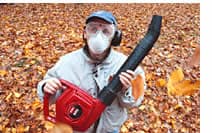23 Nov Turning Over a Few New Leaves: The Backstory
I have always been interested in the social aspects of technology: that is, how new ideas brought on by technological development seep into the everyday lives of regular folk. In the last few months I’ve been contacted with greater frequency by subjects of my writing or from those who have been alerted to my stories in the process of a doing a web search. Googling is becoming a natural process. And the interactions I’m having because of it add to my sense of the enlarging net community.

In September I began my 9/11 story with a quote by Jenna Jacobs, wife of Ari Jacobs one of the people who died in the World Trade Center. A few days later Jenna�s mother contacted me and we corresponded about what it’s like to be the mother of a young widow. In October I wrote of Irina Han, an intern at our museum who was murdered on her way home one night. A few days later I received a comment on my post from a family friend. A relative of Irina’s husband also posted a few comments. We exchanged emails, both of us wondering how this tragedy could have happened.
Last week Washington Post writer, Darragh Johnson, found me. She posted a comment to one of my two stories on my annual bout with autumn foliage. She was writing an article on “man verses leaves” and wondered if she could interview me. Since it was that time of the year again, we made arrangements to meet in the middle of my “crop” this past weekend.
• • •
While last year the conditions for clearing my lawn were perfect (warm and dry weather), this year has been anything but. Timing is critical in this process. With a full time job I only have my days off to do this laborious task. Most years I’m usually able prolong the actual leaf abatement process by mowing my lawn one last time. This mulches the initial thin layer of dead stock. Good for the lawn and good for my back (which, whether I rake or blow, is always at risk).
The leaves start dropping in mid October and by Thanksgiving the ordeal is usually over. This gives me approximately three to four weekends to work. But it’s critical to get the early crop blown to the street to make way for later droppings. If you don’t, the push from the back of the yard to the curb becomes difficult. The pile gets bigger and bigger as you push forward. And more unwieldy.
This year conditions have conspired against me. While it was the most spectacular year for the fall colors I’ve seen in a while, my nature duties were overshadowed by family obligations and the weather.
Two weekends ago would have been a perfect time to work. It was dry and the leaves were, well, fluffy. But Saturday we had to attend my youngest daughter’s ballet class—once a semester parents are allowed to watch. Then we had to go to a birthday party in the afternoon. On Sunday we had to go to the outlet mall to buy shoes for both girls (half price over regular stores and worth the 120 mile round trip considering we got five pairs for $115!). The daylight hours were completely booked. Of course I wasn’t avoiding this chore. No way. Uh uh.
I had to balance these activities. And now I’m paying for it. Last weekend a Nor’easter was forecast (a front coming up the east coast). Saturday was sure to be wet and indeed it was. The leaves now completely covering my lawn are soggy and heavy (wet leaves act like cement when trying to rake or blow them). While this boded very poorly for me, it was perfect for the Post article idea. The artist in me started to visualize the whole affair. We artists have to constantly adjust to changing conditions, seeing opportunity in adversity. I started to get excited.
• • •
We scheduled to meet “in the field” at high noon. The staff photographer, Robert Reeder arrived first. He had been in contact with his editor and both were sure the weather would prevent any good photos. I had other ideas. “You’re not going to blow leaves today are you?” he queried. “Of course not,” I stated. “But this is perfect! Man verses the elements” And I was quite content to lose this battle if it meant a great idea could develop.
His editor had already given him another assignment. There had been a parking garage collapse the day before and they were still looking for a missing construction worker. He felt a need to get over there as soon as possible. I convinced him to stay at least until the writer arrived.
When she did, it was clear she too was pleased with the meteorological conditions. Rain and leafy cement. It was perfect. Robert started to understand. I grabbed my blowing paraphernalia (my Toro 850 electric blower, a huge reel of industrial strength orange extension cord, goggles, dust mask, and ear protectors). I was ready. My wife warned me not to plug in the thing for fear of electrocution in the cold rain. Robert took off, scouting for the right vantage point. I could see his mind beginning click. He was getting into this. Good.
It was a picture perfect day! He had me stand at the base of a leaf-infested embankment. He grabbed a picnic bench and had Darragh dry off handfuls of leaves. He asked her to stand on the bench and just at the right moment drop them in front of the camera to simulate a leaf downpour in front of me. He used a fisheye lens. Completely covered in my uniform, I lost all interest in my soon-to-be public persona. No one would know it was me. We were quite a sight. Darragh interviewed me as Robert photographed. I imagined being on the red carpet of the Academy Awards. The paparazzi, the reporters, the leaves.
Cars driving by slowed down to watch. My neighbor, Peter, walked up, his curiosity getting the best of him. Like a true “happening” he became part of the event. We compared leaf herding styles. I admonished him for not loaning me his very efficient leaf tractor. I told stories of past years. Robert began to shoot both of us with a smile while Darragh got it all down in print. Behind my mask I could barely contain my glee.
• • •
This morning I walked outside to retrieve our Saturday paper. Luckily, my wife had taken 3 1/2 hours this past week to blow a quarter of our yard so I could find the thing. And there, on the front page of the Metro section was the headline: Let the Ground Wars Begin (PDF, 448K). I rushed inside to make the announcement.
Darragh had done her homework. She interviewed other weekend leaf men to discover their implements of choice (blowers verses rakes, the classic debate). She included statistics: a Tulip Poplar tree sheds, on the average, 25 pounds of leaves per season. Multiply that by the 35 Tulip Poplars we have on our lot and you get a total of 875 pounds of leaves! Add to that the other assorted trees (a total of 75 on our 1/2 acre lot) and that’s a lot of leaves. The next time I declare “I’ve got a ton of leaves to blow” (that’s 1000 lbs.), don’t laugh.
And what would an article on this subject be without an historical perspective (“Legend has it that Athena, the Greek goddess of wisdom and warfare, invented the rake…”) as well as a revealing statement from Jerry Herron, an academic expert:
“The American studies professor at Detroit’s Wayne State University dubs bringing in the leaves a ‘highly significant phenomenon’—particularly since the advent of the leaf blower. ‘It allows men to buy expensive and noisy equipment,’ he notes, ‘and then demonstrate their prowess in front of the whole neighborhood.’ Lawn mowing can’t compare: ‘Everybody does that.’ he says. And snow blowing is a waste: ‘The weather is too cold to allow much audience admiration.'”
The article states I heartily concur. “He hoists his Toro and shouts, ‘I’ve got this phallic power thing! I mean, look at this thing. Is this power, or what?”
Well, yes, I did say that. But it was part of the theater of the moment, meant to be a postmodern ironic statement. Personally, I could care less what the neighbors think (other than, “Oh my gawd, we’re the last ones on the block to clear our leaves”). My wife is the mechanical one in the family. She’s the one who gets excited about band saws and diamond-tipped drill bits.
And now the gods have conspired to thwart my efforts once again. It’s sunny and crisp right now. Perfect leaf blowing weather. But yesterday I came down with a bad cold and the thought of swinging that phallic instrument around for the benefit of my neighbors holds no interest, even in the name of Art.
We artists are a curious lot. The strangest things make us utterly happy. Somehow I felt responsible for bringing together the lot of us into this tableau. Oh wait, perhaps I should bow to Mother Nature on this one.
Related Stories:
Spores, Spores, and More Spores (October 28, 2001)
Moving Forward on a Number of Fronts (December 10, 2001)
Leaving: The Movie, an independent short film documenting our last International Leaf Festival (Quicktime 2.2 MB)
Let the Ground Wars Begin, Washington Post article by Darragh Johnson (November 23, 2002)
Photo courtesy of Robert A. Reeder, The Washington Post, © 2002





Donna
Posted at 19:51h, 23 NovemberThat’s great! Fun story. It’s amusing that if one didn’t know you, you could come off as a sort of a leaf-blowing-redneck…
You aren’t, of course.
Good stuff. Maybe there’s a way to make them fall up.
jh
Posted at 21:49h, 23 NovemberWow! I had no idea it was such a serious business! Guess it is when you really do have a ton of leaves to deal with.
Great story — makes me curious about about several aspects: you talk about it being critical to get the early crop blown to the street. What happens then? Do municipal leaf collecting trucks come by the scoop up everyone’s crops?
And the schism between blowers and rakers… does this manifest in, say, snide comments tossed over fences, or reprimanding glances directed at one’s ideological foes?
Then of course there are the economic aspects. Don’t the neighbourhood kids see this as a huge opportunity? I bet some good money could be made from offering to clear people’s leaves. Sounds like you could easily make enough to buy a PLayStation which you could then spend the winter enjoying indoors.
Jeff
Posted at 09:12h, 24 NovemberDonna, make the leaves blow up! Ha, they do, right in my face. That’s the bad part of a dry leaf bed. They fly all over the place and you have to develop an expert hand at how you aim that blower. I aim the nozzle low and “push” in short bursts. Keeps the leaves close to the ground.
JH, yes, the county comes by twice a year with huge vacuums on wheels. Workers, dressed in bright orange overalls and dust masks rake the leaf piles (which are sitting at the curb, by the street) into these vacuums which mulch the leaves and dump them in the bed of the truck. You can see the whole process if you take a look at “Leaving: The Movie,” a short Quicktime piece I did when they came last year.
It’s best to stay indoors when the county does it work. The mulching spews a fine leaf dust over everything. I was afraid I was going to wreck my camera. And I had to go through a thorough leaf dust detox immediately after to wash the stuff from my clothes and body.
In our neck of suburbia everyone does their own thing and there is very little discussion over methodologies. It’s not really a neighbor verses neighbor thing. It’s really a neighbor verses the county. The race is to see if you can get your piles to the edge of your property in time.
Since we have a lotta leaves and it’s a far blow to the edge of our property, the job is not attractive (or cost effective) to young leaf raking entrepeneurs. Takes too long to do. And you can make more money raking on other streets with less trees.
Owen Davies
Posted at 23:34h, 26 NovemberYou got me thinking about my teen years when mowing, raking, and shoveling were a sorely needed income opportunity. In those days, I resented neighborhood geezers who insisted on doing their own yard work instead of paying me to do it for them. So, even though I enjoyed reading about your adventures, my inner teen still resents you.
Jeff
Posted at 09:30h, 28 NovemberWell, speaking as a neighborhood geezer, if ONLY some young entrepreneur offered to do in those leaves I’d gladly pay for at least one pass.
It is, afterall, a fall tradition. It’s a meditative process. I often come up with some interesting art ideas while blowing. So, despite my autumnal complaining, I don’t want to give up the job entirely.